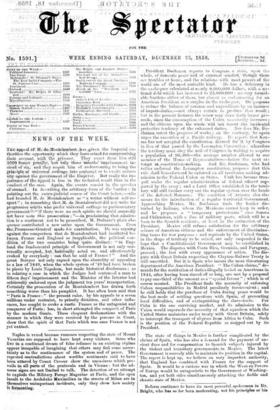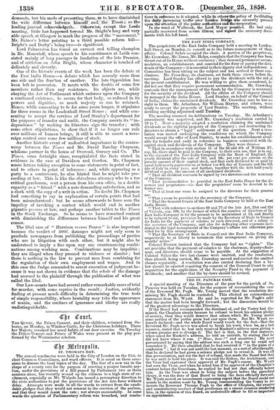NEWS OF THE WEEK.
Td...eafifi do .Monfatlembent Ants xiven the Imperial au- thorities the opportunity which they have seized for compromiSing their account with the prisoner. They exact from him still 3000 Iranes penalty, but 'only three 'Audis! imprisonment in- stead of six, and they acquit Min of endeavouring- to bring the tutiverryl. suffrage into conte?mpt or to excite animo- 'against the:government of the Emperor. But really the im- petanee, of the AK,* is less in the technical result than in the conduct of the case.. Again, the events consist in the speeches efebunsel. In describing the arbitrary form of the burden ; in pointing out the extra-judicial course of the Court below,—who had branded M. de Montalembert as "a writer without self-re- spect ; in-remarking that:M. de Montalembert did not write for progressive snirits prefer' universalsuffrage to parliamentary
, „ ,
government-!!--" if there were no such spirits we should assuredly not have seen this prosecution ; "—in proclaiming that admira- tion is a sentiment not to be proscribed, M. Dufaure's plain elo- quence contributed a new satire upon the Government. Even the.Trootreur'-General made his contribution. He was arguing against the comparison that de Montalembert had instituted be- twean.Erorme,.and England as inapplicable, the political con- dition of the, two countries being quite distinct : "in Eng- land. the fundamental prineiple of Government is not only uni- versally.- necepted, -.but hahitnally acted on, and affectionately evoked by everybody : can that be said of France ?" And the great Berryer not only argued upon the absurdity of appealing to a law of 1849, when the whole system of '49 had been broken to pieces by Louis Napoleon, but made historical disclosures ; as in relating a case in which the Judges had sentenced a man to fifteen days' imprisonment and the Minister of the Interior had arbitrarily endorsed upon the judgment ten years' transportation. Certainly the prosecution of de Montalembert has drawn forth something worse than his pamphlet. It has often been said that "Paris is France : " the present ruler, by his appeals to a seven millions under restraint, to priestly dictation, and other influ- ences, has sought to evoke a rustic France as the antagonist and conqueror of Pyxis; has, in short attempted the conquest of Paris by the modern Gauls. These eloquent declamations with the manner in -Which they were received by the persons in Court, show that the spirit of that Paris which was once France is not yet' extinct.
Naples is vexed because rumours respecting the state of Mount Veauvias are supposed to have kept away visitors. Some who live in a continued dream of false reliance in an existing regime appear incapable of imagining that others may feel some uncer- tainty as to the continuance of the system and of peace. The repeated contradictions about warlike sentiments said to have been uttered by Count Cavour show the uneasiness which pre- vails in all parts of the peninsula and in Vienna ; but the ad- verse signs are not limited to talk. The detection of an attempt to explode the Military Forage Magazine at Pavia, and the open insult to the Archduke Maximilian in the streets of Milan are in themselves unimportant incidents, only they show how society is fermenting.
Prest ent. Buchanan reports to Congress a state, upon the whole, Of domestic peace and Of external 'confliet;fls gi II* ute. troubles at home, and the relations with most pewers of the world are of the most amicable kind. He has a deficiency in the exchequer calculated at nearly 8,000,900 dollars, with a na, tionalliebt which has increased to 25,090,000 : no very fernaid- able bnrdens c.ither of them, but almost as embarrassing for an American President as a surplus in the exehequer.' Ito iprojit4s to reduee the balance of revenue and eipenditure by an increase of import-duties,—not always certain to produce that result ; but in the present instance the Screw may draw forth larger pro- ceeds, sines the consumption of the Union necessarily increases ; and the citizens up-on the NVII01B) will net resent the illeitioqal protective tendency of the enhanced duties. Nor does isf.r..BU-. chanan arrest the .progress of works ; on the contral.y, he.a0ain urges the execution of a Pacific railway. He reports that.kan-, sas has not accepted the constitution decreed for it by Congress in lieu of that passed by the Lecotuptou Convention; wherefore the territery must obey the will d Congress in waiting to acquire a population of 93,490—the average number allowed to one member of the House of Representatives—before the next at-. tempt :aconstitution-maling. And Mr. Buohanan, who. :had. rather endorsed the Lecompton constitution, proposes that this rule shall henceforward be enforced on all territories seeking ad- mission to the Federal Union as States. Utah has become tran- quil under the regular administration of federal .officerl. sup- ported by the army ; and a Land Office established in the terri- tory will still further carry out the regular system over the heads of the defeated Mormons. The condition of Arizona also cla- mours for the introduction of a regular ten-Aerie]. Government. Approaching Mexico, Mr. Buchanan finds the border dis- turbed by Indians, whom the Mexicans cannot keep in order, and he proposes a " temporary protectorate"' over Sonora. and Chihuahua, with a line of military posts, which will be a boon to the Spanish residents, at least in the estimation of the, President. Mexico still refuses satisfaction -for the arbitrary seizure of American citizens and the enforcement of discrimina- ting taxes for war purposes ; and reprisals by the United States, in the shape of territory to be seized, are only suspended in the hope that a Constitutionist Government may be established in: Mexico. -The disputes with Costa Rica, Grenada, and Paraguay,: proceed ; the last with every appearance of action. The dis- pute with Great Britain respecting the Clayton-Bulwer Treaty is still unsettled. But it is Spain who incurs the most threatening- deportment of the American President. " The Cuban claims," de- mands for the restitution of duties illegally levied on Americans in 1844, after having been staved off so long, are met by a proposal to pay one-third of the amount as a "special faVour." ; which is of, course scouted. The President- finds the necessity 'of enforcing Cuban responsibilities in Madrid peculiarly inconvenient ; and he still holds that the purchase of Cuba during peace would be the best mode of settling questions with Spain, of preventing, lc-al difficulties, and of extinguishing the slave-trade. For Cuba is the one surviving market, and its .admission to the Union would supersede the necessity of that squadron which the United States maintains under treaty with Great Britain, solely to intercept the transport of n'egroes from Africa to Cuba. Such, is the position of the Federal Republic as mapped'- out by its President.
The state of things in Mexico is further complicated by the claims of Spain, who has also a demand for the payment of an- cient dues and for compensation to Spanish subjects injured by the violent and transitory governments in Mexico. The latest Government is scarcely able to maintain its position in the capital. The report is kept up, we believe on very imperfect authority, that England has combined with France for the support of. Spain. It would be a curious war in which the West+ rn Powers of Europe would be antagonistic to the Government of Washing- ton, and yet both sides simultaneously attacking the feeble and chaotic state of Mexico.
- Reform continues to have its most powerful spokesman in' Mr. Bright, who has so far been moderating, not his principles or his demands, but his mode of presenting them, as to have diminished the wide difference between himself' and the Times ; as the leading journal aelcnowledgeth. Otherwise, except the Leeds meeting, little has happened beyond Mr. Drighesiong and very able speech at Glasgow to mark the progress of the "movement." Mr. Baines's letter pointing to a third possible reform bill- Bright's and Derby's being two—is significant. Lord Palmerston has found an earnest ancl telling champion in Mr. Moncrieff, whose speech to his constituents at Leith con- sisted mainly of long passages in laudation of the late Premier, and of criticism on John Bright, whose character is touched off delicately and cleverly.
One of the historic events of the week has been the debate at the East India House—a debate which has scarcely more than one side and the fraeion of another. The late Opposition has been left in possession. It meets with the doubts of some few members rather than any resistance. Its objects are, while obeying the Act of Parliament which enforces upon the Company a continued existence, to secure for that body, so reduced in its powers and dignities, as much majesty as can be retained. Hence while consenting to be for some years longer, it stipulates for three rooms in the Leadenhall Street House ; and while con- senting to accept the services of Lord Stanley's department for the purposes of transfer and audit, the Company asserts its " in- dependence " by making its Directors sign the transfer ; with some other stipulations, to show that if it no longer can rule over millions of human beings, it still is able to assert a sove- reign control over some few millions of stock., Another historic event of undoubted importance is the contro- versy between the Times and Mr. David Barclay Chapman, whilome partner in the house of Overend, Gurney and Co. The Times, some fortnight since, recapitulated the facts stated in evidence in the case of Davidson and Gordon. Mr. Chapman wrote letters taking exception to some statements in point of fact, and to others in point of inference ; and, while appearing as a party to a controversy, he also hinted that he might take pro- ceeding at law. This is like the chivalrous attorney who to a too critical gentleman, sent a person from his own office, in a double capacity as a " friend " with a note demanding satisfaction, and as a clerk with the copy of a writ in action. No doubt Mr. Chapman had something to say in explanation of certain points that had been misunderstood ; but he seems afterwards to have seen the impolicy of invoking a contest which would end in another gigantic process at law, and perhaps another tablet to the Times in the Stock Exchange. So he seems to have remained content with diminishing the differences between himself and his great censor.
The libel ease of " Harrison versus Pearce" is also important because the verdict of 500/. damages might not only seem to preclude newspapers from publishing the proceedings of parties who are in litigation with each other, but it might also be understood to imply a fine upon any one countenancing combi- nations among working men. Combinations may be impolitic ; they are illegal when they proceed to violence or slander ; but there is nothing in the law to prevent men from combining for the regulation of their own employment and wages. And in this case the Judge consented to arrest execution of judgment be- cause it was not shown in evidence that the whole of the damage had accrued to the plaintiff through the publication of what was called the libel.
Our Law-courts have had several rather remarkable cases of trial for murder, with some caprice in the result ; Justice, evidently finding at present much difficulty in determining the true tests of simple responsibility, where brutality may take the appearance of mania, and the confines of ignorance and idiotcy are really =distinguishable.



























